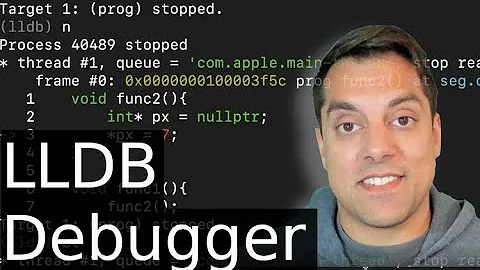How to change variables value while debugging with LLDB in Xcode?
Solution 1
expr myString = @"Foo"
(lldb) help expr
Evaluate a C/ObjC/C++ expression in the current program context, using variables currently in scope. This command takes 'raw' input (no need to quote stuff).Syntax: expression --
Command Options Usage: expression [-f ] [-G ] [-d ] [-u ] -- expression [-o] [-d ] [-u ] -- expression
-G <gdb-format> ( --gdb-format <gdb-format> ) Specify a format using a GDB format specifier string. -d <boolean> ( --dynamic-value <boolean> ) Upcast the value resulting from the expression to its dynamic type if available. -f <format> ( --format <format> ) Specify a format to be used for display. -o ( --object-description ) Print the object description of the value resulting from the expression. -u <boolean> ( --unwind-on-error <boolean> ) Clean up program state if the expression causes a crash, breakpoint hit or signal.Examples:
expr my_struct->a = my_array[3]
expr -f bin -- (index * 8) + 5
expr char c[] = "foo"; c[0]IMPORTANT NOTE: Because this command takes 'raw' input, if you use any command options you must use ' -- ' between the end of the command options and the beginning of the raw input.
'expr' is an abbreviation for 'expression'
Solution 2
The following stuff works for me. I am using Xcode 8.
If you want to set some variable (for example a "dict") to nil and then test the code flow, you can try the following.
- Put the breakpoint properly after initialised to the desired value.
- then execute "expression dict = nil" in lldb command line to change it. (for example "nil")
- Step over the break point.
- Check the variable "dict" in the next line. It will be nil.
It will look something like in the console.
(lldb) expression dict = nil
(NSDictionary *) $5 = nil
Solution 3
If you are using Xcode 10 or 11 put the breakpoint properly after initialised to the required variable then you can change your variable using po myString = "Hello World" easily.
Related videos on Youtube
Eric
I got keys coming from KVC Cost a newbie 200 leaks I'm a Swift commando, Xcode for example This coding lifestyle is hard to handle So I go debug cause I'm more like a test player Thug, branded in the business-layer So many agile haters, imitators steady swanging Make me wanna start break pointing
Updated on February 24, 2020Comments
-
Eric about 4 years
In Xcode, GDB allows you to change local variables while debugging (see how to change NSString value while debugging in XCode?). Does LLDB offer a similar functionality? If so, how can we use it?
-
 mfaani over 4 yearsMake sure to see Advanced debugging in iOS. It's awesome
mfaani over 4 yearsMake sure to see Advanced debugging in iOS. It's awesome -
Nick Wright about 4 yearsI'm trying to set an objects property, which works if the string length is between 0-15 characters. Setting a string of 16 or more characters is accepted, but when i print it back, it shows me a nonsense string: po myObj.someString = "1234567890123456", which works, but when i print I get (String? $R68 = "\0\0\0\0@\a\u{1}\c{5}\0\0\0\0\0\0\"
-
-
Eric about 12 yearsIndeed, thanks! One more little question: I'm doing this to try to change the text of a UILabel:
'expr myLabel.text = @"hello!"but I get anerror: property 'text' not found on object of type 'UILabel *'... Any thoughts? -
Matthias Bauch about 12 years
expr (void)[label setText:@"Foo"]should do it. Dot-Syntax usually won't work in the debugger. lldb probably interprets it as you wanted to access a member of a c-struct, but I'm not sure if this is the reason it won't work. Dot-Syntax doesn't work forpoeither. instead ofpo label.textyou have to usepo [label text] -
BJ Homer about 12 yearsActually, lldb handles dot syntax much better than gdb. gdb just assumes you're treating it like a C-struct, which fails. lldb will correctly access properties, but only if they're actually declared with
@property. -
funroll over 10 yearsYou can also use
pas a shortcut forexpr. Example:(lldb) p url = @"http://google.com" -
Ray Hunter over 8 yearsI found that while using LLVM and Swift, if I had a method parameter that was passed and I tried to change it, the value would change, but the code would not recognize the change (ie I changed a Bool from false to true). I had to change the value in LLVM before the method call and then the code would see the change.
-
Jason Newell about 8 yearsYou can also use
eas a shortcut forexpr. BTW,pis an alias for print which is an alias forexpr --(just evalue raw input, no flags)expr -o -- [object]orpogenerally gives you more useful output for objects though.





